Did you know that over 90% of adults in the United States don’t consume enough fruits and vegetables daily according to the CDC? This gap in nutrition leaves many people vulnerable to weak immunity, chronic inflammation, and fatigue. On our fanpage, one of the most common questions we receive is: “What’s the simplest juice I can make at home to boost my immune system naturally?”
A powerful answer is carrot ginger turmeric juice. This vibrant orange drink combines three nutrient-packed ingredients that are not only delicious but also supportive of overall wellness. Carrots bring beta-carotene and antioxidants, ginger adds digestive and immune benefits, and turmeric is known worldwide for its anti-inflammatory properties.
In this article, we’ll explore the science behind each ingredient, step-by-step recipes, practical tips, and creative variations. You’ll also discover how to make this juice part of your lifestyle in ways that feel effortless and enjoyable.
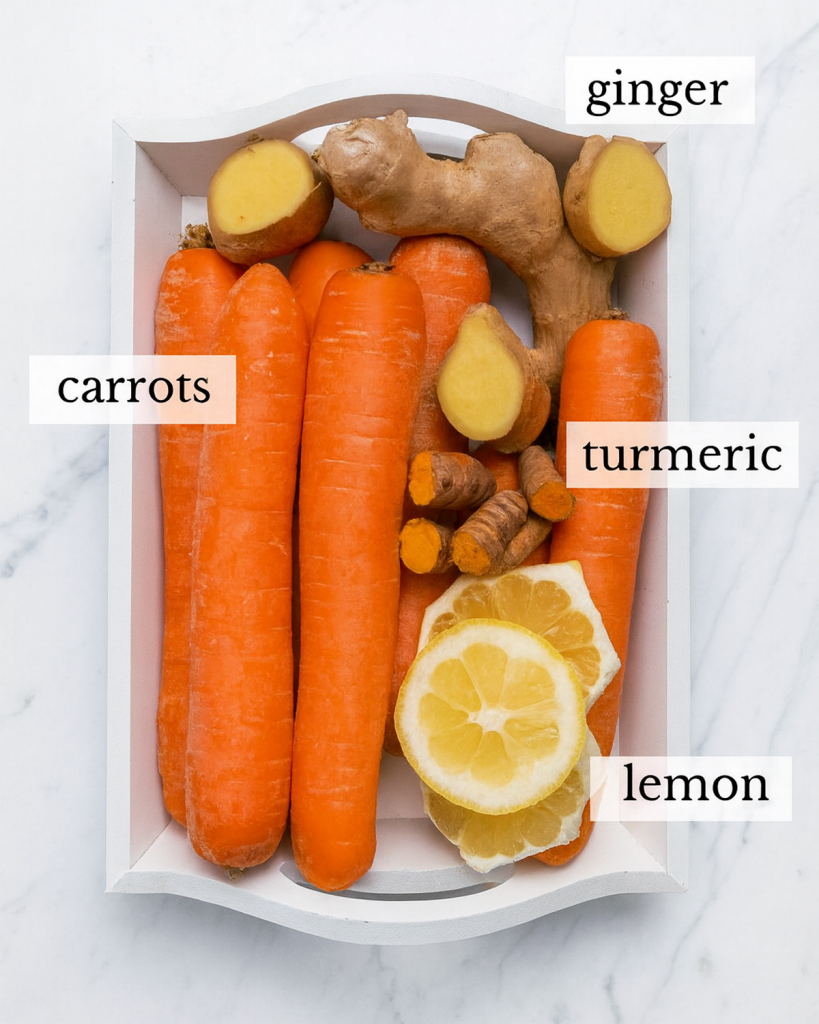
Why Carrot, Ginger, and Turmeric Work Together
Carrots: The Antioxidant Base
Carrots are rich in beta-carotene, a precursor to vitamin A, which supports vision, skin, and immunity. They also contain vitamin C and fiber, making them an excellent juice base.
Ginger: The Warming Root
Ginger is valued in both Ayurveda and modern nutrition for its compound gingerol, known for anti-inflammatory and antioxidant properties. It may also help ease nausea and promote digestion.
Turmeric: The Golden Spice
Turmeric’s active compound curcumin is one of the most studied natural anti-inflammatory agents. It has been linked to supporting joint health, reducing inflammation, and boosting immunity when paired with black pepper to enhance absorption.

Synergy of Ingredients
Together, these three ingredients create a juice that:
- Supports immune function.
- Helps reduce oxidative stress.
- Provides natural energy without caffeine.
- Offers anti-inflammatory support.
Nutrition Profile of Carrot Ginger Turmeric Juice
| Ingredient | Key Nutrients | Main Benefits |
|---|---|---|
| Carrot | Beta-carotene, vitamin A, vitamin C | Vision, immunity, skin health |
| Ginger | Gingerol, antioxidants | Anti-inflammatory, digestive support |
| Turmeric | Curcumin, manganese, iron | Anti-inflammatory, immune boost |
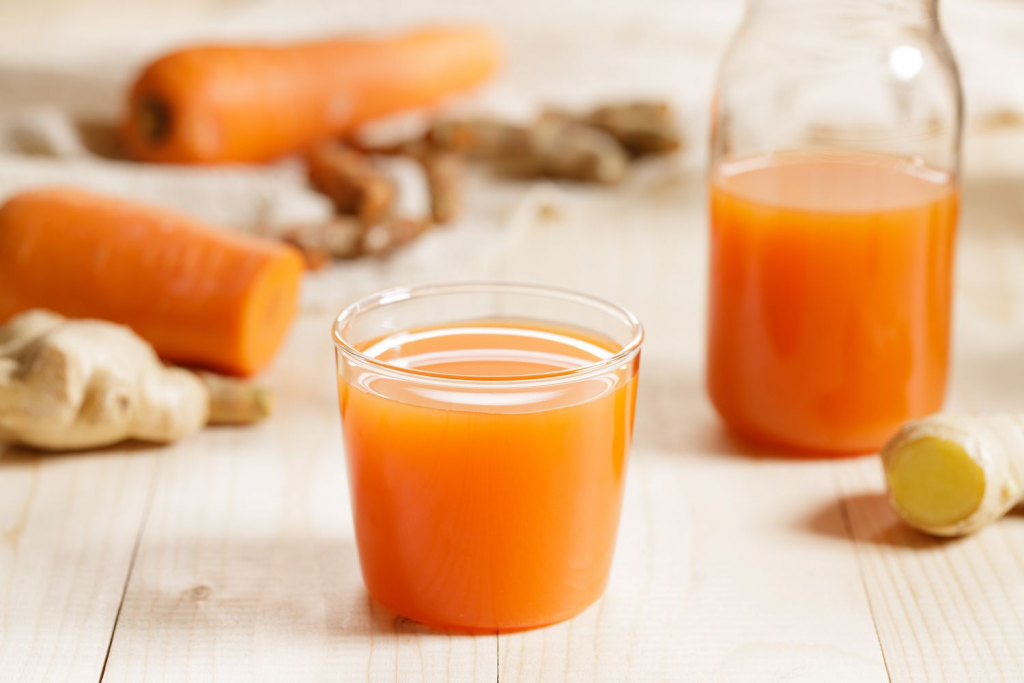
How to Make Carrot Ginger Turmeric Juice
Ingredients
- 5 medium carrots
- 1 inch fresh ginger root
- 1 inch fresh turmeric root (or ½ teaspoon ground turmeric)
- 1–2 cups filtered water
- ½ lemon, juiced
- Pinch of black pepper (to enhance curcumin absorption)
- Optional: 1 teaspoon honey for sweetness
Instructions
- Wash and peel carrots, ginger, and turmeric.
- Cut into small pieces.
- Add all ingredients to a blender with water.
- Blend until smooth.
- Strain using a fine mesh sieve or nut milk bag.
- Serve chilled or over ice.
Tip: Drink fresh to preserve nutrients, but you can store it in the fridge for up to 48 hours.
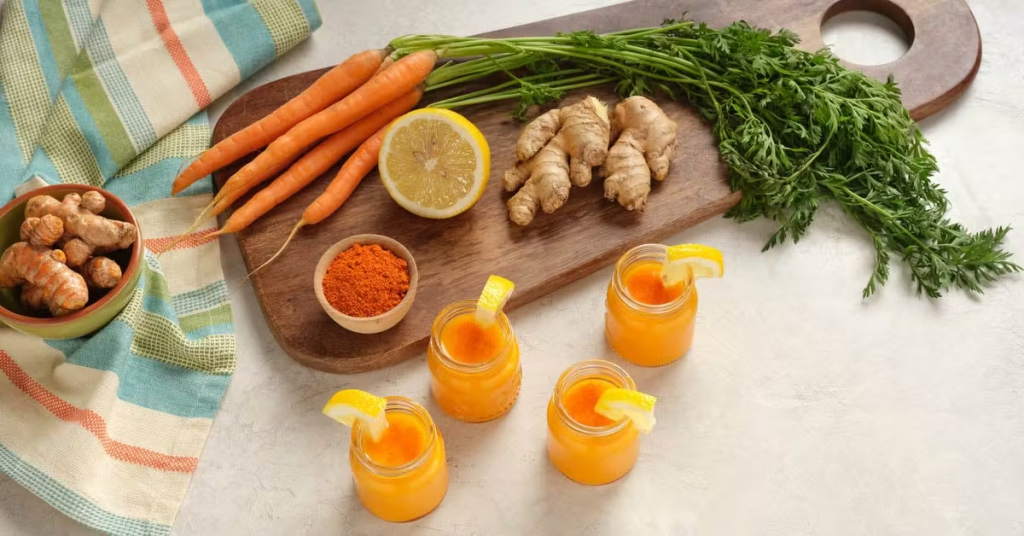
Creative Variations to Try
- Carrot Apple Ginger Turmeric Juice: Add one apple for natural sweetness.
- Spicy Kick: Add cayenne pepper for metabolism support.
- Green Boost: Blend in spinach or kale for added antioxidants.
- Creamy Version: Mix with coconut milk for a golden latte-inspired drink.
Health Benefits of Regular Consumption
Immune Support
Vitamin A from carrots and curcumin from turmeric work together to support immune defenses.
Anti-Inflammatory Effects
Both ginger and turmeric contain compounds that may help reduce inflammation when consumed consistently.
Digestive Comfort
Ginger has long been used to ease mild nausea and support gut health.
Natural Energy
Carrot’s natural sugars provide a gentle energy lift without a crash.
Skin and Hair Health
The antioxidants in carrots and turmeric contribute to a glowing complexion.
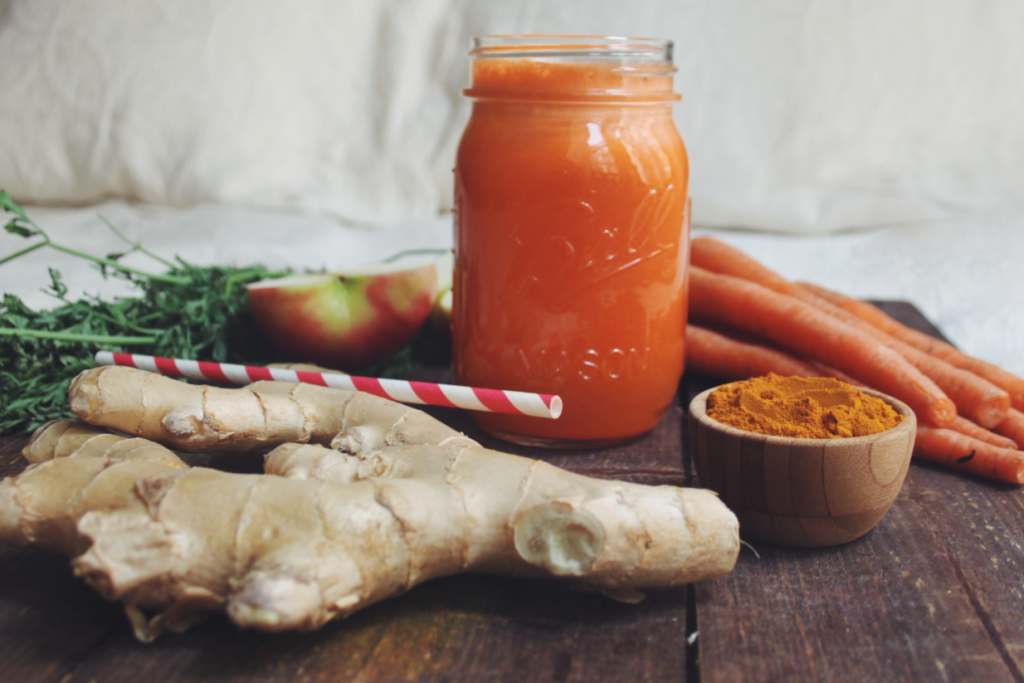
Practical Tips for Daily Use
- Morning Routine: Drink a small glass on an empty stomach for an energizing start.
- Post-Workout: Helps with recovery thanks to anti-inflammatory compounds.
- Meal Pairing: Enjoy with lunch to boost digestion.
- Weekly Prep: Make a batch every two days and refrigerate.
- Consistency: Best results come from daily or near-daily use.
A 7-Day Carrot Ginger Turmeric Challenge
Day 1: Drink the classic juice with lemon.
Day 2: Add apple for sweetness.
Day 3: Try the spicy cayenne variation.
Day 4: Blend with coconut milk for a golden smoothie.
Day 5: Add leafy greens for an antioxidant boost.
Day 6: Use as a post-workout recovery drink.
Day 7: Reflect on how your body feels after one week.
Common Myths About Carrot Ginger Turmeric Juice
“It cures all diseases.”
Not true. It may support wellness but does not replace medical treatments.
“You can’t drink it daily.”
False. Moderate daily consumption is safe for most people.
“Powdered turmeric is useless.”
Not correct. Fresh is ideal, but powdered still provides curcumin.
“More turmeric means better results.”
Too much may upset digestion. A small amount is enough.
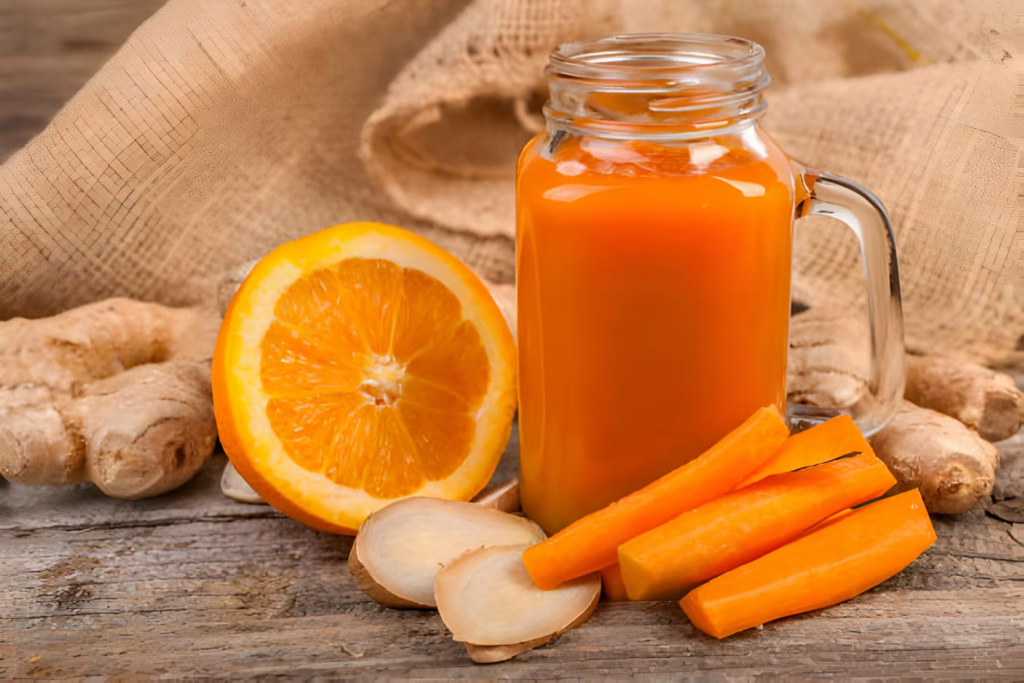
Safety and Precautions
- People on blood-thinning medications should consult a doctor before heavy turmeric or ginger use.
- Excess carrot juice may lead to temporary skin yellowing (carotenemia).
- Pregnant women should use ginger and turmeric in moderation.
- Always wash roots thoroughly to remove dirt and residue.
Conclusion
Carrot ginger turmeric juice is a simple, vibrant, and nutrient-packed drink that offers immune support, anti-inflammatory benefits, and natural energy. With just a few ingredients, you can create a daily wellness ritual that refreshes your body and nourishes your health.
It’s not about miracles but about consistent habits. Adding this juice to your lifestyle may help you feel stronger, more energized, and more balanced every day.
FAQ
Q1: Can I use powdered turmeric instead of fresh root?
Yes, ½ teaspoon powdered turmeric can replace 1 inch of fresh root.
Q2: How often should I drink carrot ginger turmeric juice?
1 small glass daily or several times a week is ideal.
Q3: Can kids drink this juice?
Yes, in small amounts, but reduce ginger and turmeric to avoid strong flavors.
Q4: Should I add black pepper to turmeric juice?
Yes, black pepper enhances curcumin absorption.
Q5: Can I make it ahead of time?
Yes, store in a glass container in the fridge for up to 48 hours.
*Disclaimer: This article is for informational purposes only. It does not provide medical advice, diagnosis, or treatment. Always consult with a qualified healthcare provider before making dietary changes.




